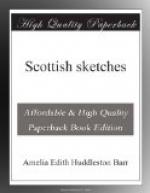John had no answer ready, and indeed Jenny gave him no time to make one: she went off with a sob in her voice, and left the impulsive old matchmaker very unhappy indeed. For he had an unmitigated sense of having acted most imprudently, and moreover, a shrewd suspicion that Jenny’s analysis of Deacon Strang’s tactics was a correct one. For the first time in many a year, a great tide of hot, passionate anger swept away every other feeling. He longed to meet Strang face to face, and with an hereditary and quite involuntary instinct he put his hand to the place where his forefathers had always carried their dirks. The action terrified and partly calmed him. “My God!” he exclaimed, “forgive thy servant. I hae been guilty in my heart o’ murder.”
He was very penitent, but still, as he mused the fire burned; and he gave vent to his feelings in odd, disjointed sentences thrown up from the very bottom of his heart, as lava is thrown up by the irrepressible eruption: “Wha shall deliver a man from his ancestors? Black Evan Callendar was never much nearer murder than I hae been this night, only for the grace of God, which put the temptation and the opportunity sae far apart. I’ll hae Strang under my thumb yet. God forgie me! what hae I got to do wi’ sorting my ain wrongs? What for couldna Davie like some other lass? It’s as easy to graft on a good stock as an ill one. I doobt I hae done wrong. I am in a sair swither. The righteous dinna always see the right way. I maun e’en to my Psalms again. It is a wonderfu’ comfort that King David was just a weak, sinfu’ mortal like mysel’.” So he went again to those pathetic, self-accusing laments of the royal singer, and found in them, as he always had done, words for all the great depths of his sin and fear, his hopes and his faith.
In the morning one thing was clear to him; David must have his own house now—David must leave him. He could not help but acknowledge that he helped on this consummation, and it was with something of the feeling of a man doing a just penance that he went to look at a furnished house, whose owner was going to the south of France with a sick daughter. The place was pretty, and handsomely furnished, and John paid down the year’s rent. So when David returned with his young bride, he assumed at once the dignity and the cares of a householder.
Jenny was much offended at the marriage of David. She had looked forward to this event as desirable and probable, but she supposed it would have come with solemn religious rites and domestic feasting, and with a great gathering in Blytheswood Square of all the Callendar clan. That it had been “a wedding in a corner,” as she contemptuously called it, was a great disappointment to her. But, woman-like, she visited it on her own sex. It was all Isabel’s fault, and from the very first day of the return of the new couple she assumed an air of commiseration for the young husband, and always spoke of him as “poor Davie.”




